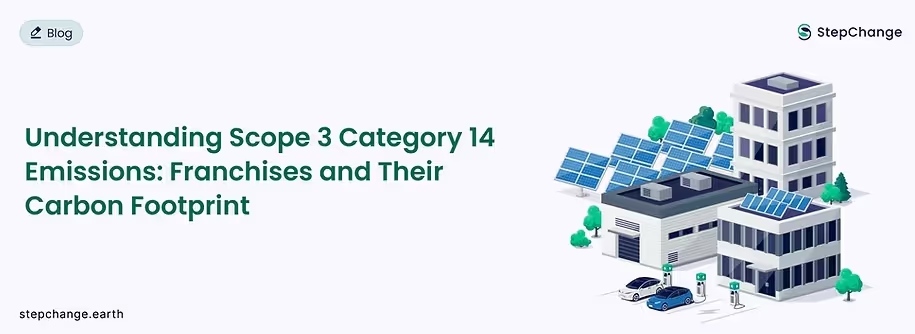
Solutions
Carbon Management
ESG Intelligence
Climate & Nature Risk
Data Registry
Beta
Sector
Get started, schedule a demo or request a free assessment!


In the global push towards sustainability, businesses are increasingly aware of their environmental impact. While direct emissions from owned or controlled sources (Scope 1) and indirect emissions from purchased energy (Scope 2) are relatively straightforward to measure, Scope 3 emissions present a more complex challenge. Among the 15 categories of Scope 3 emissions, Category 14, Franchises, deserves particular attention for businesses operating under a franchise model.
Scope 3 emissions encompass all indirect greenhouse gas emissions that occur in a company's value chain but are not under its direct operational control. These emissions are divided into upstream and downstream categories, with downstream emissions including activities such as the use of sold products and transportation of those products to end-users.
Scope 3 Category 14 emissions encompass all emissions resulting from the operation of franchises that are not already accounted for in Scope 1 or Scope 2. This category is specifically relevant to franchisors, which are companies that grant licenses to other entities (franchisees) to sell or distribute their goods or services in exchange for payments, such as royalties.
To put it simply, if you are a franchisor, you need to account for the Scope 1 and Scope 2 emissions of all your franchisees under this category.
For franchisees, they should include emissions from operations under their control in this category if they have not included those emissions in scope 1 and scope 2 due to their choice of consolidation approach. Franchisees may optionally report upstream scope 3 emissions associated with the franchisor’s operations (i.e., the scope 1 and scope 2 emissions of the franchisor) in category 1 (Purchased goods and services).
Including Category 14 in Scope 3 reporting provides a more comprehensive understanding of a company's overall carbon footprint. For franchisors, it acknowledges their responsibility for the environmental impact of their brand's operations across numerous locations. By measuring and managing these emissions, franchisors can:
Several industries rely heavily on the franchise model, making them particularly susceptible to the impacts - and responsible for the reporting – of Category 14 emissions. These include food and beverages, Hospitality, Retail, and the Service industry specially those offering services like cleaning, fitness, education and business support.
The Food and Beverage (F&B) industry, which includes fast food chains, restaurants, coffee shops, and beverage companies, is heavily reliant on the franchise model. This makes Scope 3 Category 14 emissions a critical component of the industry's overall carbon footprint.
Challenges in Measuring Emissions include accurate data collection from a large number of geographically dispersed franchisees is challenging. Franchises may differ in size, menu offerings, and operational practices, leading to varying emission profiles which makes it difficult to track emissions.
The hospitality industry includes hotels, motels, resorts, and other lodging establishments that often operate under a franchise model. These businesses have unique challenges due to their high energy consumption and resource-intensive operations.
The challenge of calculating these emissions in the hospitality industry is that franchise hotels have varying sizes - boutique properties to large resorts with vastly different operational needs. Another challenge is the seasonality of the industry - energy use ca fluctuate significantly based on occupancy rates and seasonal demand.
Retail franchises include stores selling clothing, electronics, home goods, or groceries under a franchised brand name. The retail sector's emissions are heavily influenced by energy use in stores and supply chain logistics.
Challenges in Measuring Emissions from retail for this category often stem from fragmented data sources as most retail franchises operate independently, making it difficult for franchisors to collect standardized data across all locations.
Scope 3 Category 14 emissions represent a significant portion of the carbon footprint for industries reliant on the franchise model—F&B, hospitality, and retail being prime examples. Each industry faces unique challenges but also has opportunities for impactful emission reductions through targeted strategies such as improving energy efficiency, reducing waste generation, optimizing supply chains, and transitioning to renewable resources.
By measuring these emissions comprehensively and collaborating with franchisees on sustainability initiatives, franchisors can not only lower their environmental impact but also align their operations with growing stakeholder expectations for transparency and climate action.
Scope 3 Category 14 emissions represent a significant portion of the overall carbon footprint for companies operating under a franchise model. By understanding, measuring, and actively managing these emissions, franchisors can drive positive environmental change, enhance their brand reputation, and meet the growing expectations of stakeholders. Embracing sustainable practices across the franchise network is not only good for the planet but also makes good business sense.

.svg)